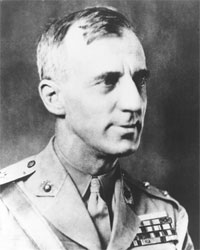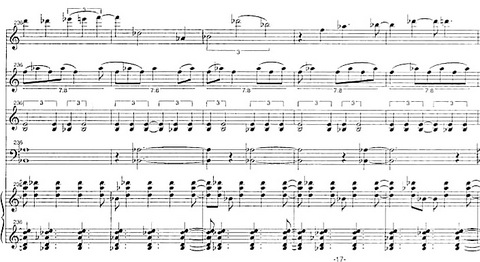PostClassic: January 2009 Archives
The beboppers are good. But they closed more clubs than they opened.
Somehow through the end of last semester, a few measures every weekend, I also managed to finish my piece for pianist Sarah Cahill's "A Sweeter Music" project, a series of anti-war pieces that she'll be premiering through the year, which has been getting a lot of attention at New Music Box. The composers, besides me, are Meredith Monk, Frederic Rzewski, Terry Riley, Yoko Ono, Bernice Johnson Reagon, Pauline Oliveros, Peter Garland, Paul Dresher, Carl Stone, Ingram Marshall, Jerome Kitzke, Phil Kline, Mamoru Fujieda, Larry Polansky, Michael Byron, The Residents, and Preben Antonsen. Terry told Sarah he wouldn't write an anti-war piece, but he'd write a pro-peace piece. In response, I told her I'd be happy to write a piece titled "Dick Cheney Is A Lying Asshole."

But I didn't. Instead, it's called War Is Just a Racket. Brian McLaren, to whom I am deeply grateful for it, sent me a wonderful text by General Smedley Butler. Butler (pictured) was a popular general who, in 1933, was approached by a bunch of plutocrats (including apparently Prescott Bush, the outgoing pResident's grandfather) who wanted to stage a quiet coup, reducing FDR to a figurehead and setting up a government friendlier to Hitler and Mussolini. It was an attempt at a fascist takeover, and they thought with Butler on their side, the army would play along. Butler feigned interest for awhile, but after he'd gotten enough information, he marched straight to Congress and turned the bastards in. No one seems sure exactly what happened, but apparently FDR agreed not to jail them all if they'd stand out of the way of the New Deal - and that's what it took to get the New Deal through the first time (of which we now need another one).
Anyway, that's the background, with plenty of relevance to what's been going on in recent years. The text itself is just a 1933 speech Butler gave in retirement detailing his disillusionment with the purposes for which the U.S. Government uses its armed forces. I believe in political music, but I've come to think that it's really only effective with text, and Sarah wanted a solo piece. So I rather borrowed the device that Christian Wolff used in his 1971 Accompaniments for Frederic Rzewski, whereby the pianist speaks the text at a normal pace, and chords associated with certain syllables are played along with the words, in a speech-determined rhythm. (My Custer piece was also indebted to Accompaniments, which seems to remain a pretty well-known work, even though Christian later disavowed its Maoist politics and it's never come out on CD.) Writing this for a pianist took me way out of my comfort zone, because playing the piano and speaking are two things I've never been able to do at the same time - when I try to do it in class, I get all tongue-tied and clumsy. (One uses the right brain and one the left, and I have a theory about how my brain hemispheres are more disconnected than average.) But Sarah says she can do it, and I tried to make it graceful. She premieres it March 12 in New York. It strikes me as peculiar that this is the second time I've set to music words by a general.
Anyway, here's the Smedley Butler text, and thanks, Brian. And Sarah.
War is just a racket. A racket is best described, I believe, as something that is not what it seems to the majority of people. Only a small inside group knows what it is about. It is conducted for the benefit of the very few at the expense of the masses. I believe in adequate defense at the coastline and nothing else. If a nation comes over here to fight, then we'll fight. The trouble with America is that when the dollar only earns 6 percent over here, then it gets restless and goes overseas to get 100 percent. Then the flag follows the dollar and the soldiers follow the flag. I wouldn't go to war again as I have done to protect some lousy investment of the bankers. There are only two things we should fight for. One is the defense of our homes and the other is the Bill of Rights. War for any other reason is simply a racket.
There isn't a trick in the racketeering bag that the military gang is blind to. It has its "finger men" to point out enemies, its "muscle men" to destroy enemies, its "brain men" to plan war preparations, and a "Big Boss" Super-Nationalistic-Capitalism. It may seem odd for me, a military man to adopt such a comparison. Truthfulness compels me to. I spent thirty-three years and four months in active military service as a member of this country's most agile military force, the Marine Corps. I served in all commissioned ranks from Second Lieutenant to Major-General. And during that period, I spent most of my time being a high class muscle-man for Big Business, for Wall Street and for the Bankers. In short, I was a racketeer, a gangster for capitalism.
I suspected I was just part of a racket at the time. Now I am sure of it. Like all the members of the military profession, I never had a thought of my own until I left the service. My mental faculties remained in suspended animation while I obeyed the orders of higher-ups. This is typical with everyone in the military service. I helped make Mexico, especially Tampico, safe for American oil interests in 1914. I helped make Haiti and Cuba a decent place for the National City Bank boys to collect revenues in. I helped in the raping of half a dozen Central American republics for the benefits of Wall Street. The record of racketeering is long. I helped purify Nicaragua for the international banking house of Brown Brothers in 1909-1912. I brought light to the Dominican Republic for American sugar interests in 1916. In China I helped to see to it that Standard Oil went its way unmolested.
During those years, I had, as the boys in the back room would say, a swell racket. Looking back on it, I feel that I could have given Al Capone a few hints. The best he could do was to operate his racket in three districts. I operated on three continents.
By the way, I notice I'm getting advertisers over on the right lately. Be sure to click on 'em, and thank you.

